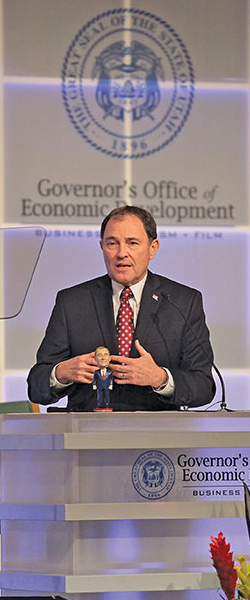On April 3rd, Gov. Gary Herbert hosted The Governor’s Utah Economic Summit 2014 in Salt Lake City, where he was the featured luncheon speaker. His theme was “Executing the Fundamentals of Economic Development” — a strategy he says is the key to Utah’s economic success. Following are excerpts from his remarks.

Photo by Matt Morgan
How We Stack Up
We are the second fastest growing state and economy in the nation. Our unemployment rate has dropped from a high of 8.4 percent when I took office to 3.9 percent today. Since January 2012 when I challenged [the Utah business community] to create 100,000 jobs in 1,000 days, nearly 90,000 jobs have been created to date. So we are on track to meet that goal. And we are just as diverse now as we are dynamic.
Today, Utah has the fourth most diverse economy in the nation. This is remarkable. It means we don’t have all of our economic eggs in one basket. We are not subject to the volatility of a single economic sector. We are building on a sure foundation for long-term economic growth.
What is the secret of Utah’s success? We believe in the fundamentals and know how to execute them to grow our economy. The fundamentals for success remain constant. One of our fundamentals is low, competitive and consistent tax rates. Utah collects the 44th lowest revenue per capita in the nation. Of the 45 states that have corporate taxes, Utah is tied for the third lowest at 5 percent. We haven’t raised corporate taxes in Utah since 1985, and I can assure you that we have no plans to do so now.
Limited Role for Government
Another fundamental is efficiency in government. We strive to keep government off your backs and out of your wallets. I’m not anti-government — it has a role to play. But that role should be limited to providing the services that we the people think are important, and the delivery of those services should be as efficient as possible. The biggest complaint I hear from the private sector, even more so than taxes, is about unnecessary regulations. Some regulations are necessary to protect the public or to ensure that everyone has equal opportunity. I understand that. But too many regulations are a drag on the economy. They impede the flow of commerce. That’s why we have not only eliminated or modified onerous regulations on the state level, but we are asking cities across Utah to do the same thing. The results are quite gratifying.
South Jordan streamlined its review process that businesses follow to occupy a new building. It also implemented a website that developers can use to track the status of their permits online. This has cut the time it takes to issue permits by up to two weeks, and we all know time is money. Brigham City lowered the fees it charges businesses for services and accelerated the approval process for zoning and subdivision changes.
We know there is much more to efficiency in government than just weeding out bad regulations. We also have a policy of living within our means. We don’t spend more than we take in. In fact, we save money for a rainy day. And we don’t take on unnecessary debt. That’s why Utah is one of only a handful of states in America today that maintains a triple-A bond rating.

Photo by Soo Jones-Kelley
Another important fundamental of our economic strength is having a skilled labor force. A high school diploma alone will not suffice in today’s highly competitive job market. So we have set a statewide goal for 66 percent of Utahans to have a degree or a post-secondary certificate by the year 2020. And we are working to ensure that the skills our students learn align with your needs in the business community. We are determined to ensure that our students are prepared to help drive Utah’s economy forward.
How Utah Will Compete
One major challenge we face is competition. It may be lonely at the top, but those at the summit soon will have lots of company from those who want to knock them off their perch. Utah, being number one, is no different. People are looking at us as the gold standard, and they want to be our replacement. Every state in the country can learn from the others’ successes and failures and explore mutually beneficial ways to grow their respective economies. But let’s not forget that the competition is out there, that it is formidable, and it’s growing. We need to continue to look for ways to meet the competition — not just to compete, but to be able to compete and to win. We will do that in three ways.
First, we will work with Utah businesses and local entrepreneurs to help them succeed. We want to help local businesses grow and become the next Fortune 500 company. One way to do this is to increase Utah’s international exports. Ninety-five percent of the world’s customers live outside the United States. We in Utah are ready to do business with all of them. I have set a goal to increase our value-added exports to $9 billion by the end of 2015. Reaching this goal will ensure continued economic expansion for many Utah businesses.
Secondly, we want to attract more businesses and venture capital to Utah.
A third way we expand our business community is through aggressive recruitment. Our message to businesses in other states is clear: If you are looking to expand and become more profitable, there is no better place to do that than here in Utah. Our taxes are low, our entrepreneurial spirit is high, and we have a pro-business and regulatory climate that is second to none. We are developing the workforce of tomorrow today, right here. Our workers are young and productive, they are tech-savvy, and they are bilingual. Utahans speak 130 different languages each day in commerce. It’s a message that has resonated in our business recruitment trips across the United States and in our trade missions abroad. I anticipate that message finding a receptive audience on our trade missions to Mexico and to Brazil later this year.
Closing Remarks
Let’s not rest on our laurels. We cannot afford to become complacent. We must run just to keep up. That’s why my commitment to our economic success has never been stronger than it is today. Yes, we have challenges. But there are also opportunities for us that often go unrecognized, because they are dressed in overalls and they look like a lot more hard work.
By recruiting new businesses to Utah and expanding the ones that are already here we will ensure that there are enough jobs for future generations.
Government’s role is to create a business-friendly environment and empower you, the private sector, to make the free market work. Your role is to grow your businesses, to hire more employees, to make more money and help keep Utah’s economy humming. Business — not government — is the backbone of Utah’s economy. The economy is strong, the fundamentals are in place, and we will continue to prosper as we adhere to the principles upon which economic success is based.
Thank you for being business leaders, entrepreneurs, risk takers and wealth creators — for creating jobs and opportunity for rising generations.
